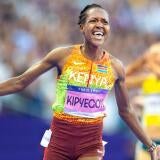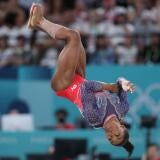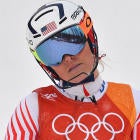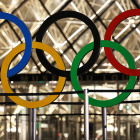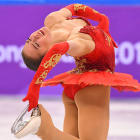Fifty years from now, Lindsey Vonn and Mikaela Shiffrin may well still be remembered as the two best, most accomplished skiers the United States has ever seen. Unfortunately, there will be a sour result attached to the final time the two ever raced in the same Olympic event.
For Shiffrin, a silver medal of validation in her first super combined competition at the Olympic level. For Vonn, her Olympic career ends in tormenting fashion.
Michelle Gisin of Switzerland took gold after completing the downhill in 1 minute, 40.14 seconds, then cruising in slalom (40.76) to combine for an aggregate time of 2:20.90. Switzerland's Wendy Holdener roared back in slalom (40.23) after an underwhelming (for her) downhill run to finish at 2:22.34 and take bronze.
Vonn, to date the greatest skier in United States history, was the last to race in Thursday's super combined competition in South Korea. After a tremendous run earlier in the day in downhill (1:39.37), the 33-year-old Vonn put herself in position for a fairytale finish. If she could aggressively and successfully manage the slalom half of the event, she would have a shot at one more gold medal. Short of that, even a clean run would practically guarantee a spot on the podium after building such a big lead due to her captivating, first-place downhill run.
But instead, Vonn's final race literally took a bad turn, as she missed a gate midway down the course and did not finish her race. No gold, no medal at all, no official crossing of the finish line in what's almost sure to be the final Olympic race of her life.
Vonn has come back from massive injuries, and her bronze in the downhill earlier in the week was a great story, but slipping up in slalom might loom over her in the future. That's a torturous way to go out, something that unfortunately symbolizes Vonn's penchant for underperforming at the Olympics throughout her career -- but this was by no means the way she should have taken off the boots for the final time on an Olympic hill.
Those in the skiing world will point to the fact that Vonn only raced slalom three times since Thanksgiving. In that respect, asking her to compete with the world's best in the super combined was a house-money situation. Vonn inspired a generation of skiers and she deserved better than a "DNF" next to her name.
Shiffrin will step into the spotlight as the face of American skiing now that Vonn's Olympic career has come to an end. This second-place finish in the ladies' alpine combined is the first silver of Shiffrin's career. She now has three Olympic medals to her name; Shiffrin won gold in giant slalom last week, and took gold in slalom in 2014. She's the first American to win gold and silver in alpine events at the Olympics since 1952.
In getting to the podium, Shiffrin matches Vonn with three career Olympic medals in alpine skiing. Only Bode Miller (six) and Julie Mancuso (four) have more in United States history. No American in history has more than Shiffrin's two golds in Olympic alpine competition.
#Silver for Shiffrin! @MikaelaShiffrin earns her second medal in the 2018 #WinterOlympics with this slalom run in the women's combined! #BestOfUS https://t.co/4YMw63E4C3 pic.twitter.com/WOcqCiVZr0
— NBC Olympics (@NBCOlympics) February 22, 2018
Shiffrin put herself in medal contention after taking sixth in the downhill portion. She was familiar with the course because she skied it three times in training runs in the lead-up to the downhill event, but opted out of competing so she could save her energy for the combined.
That wound up working in her favor, as Shiffrin raced in the 19th position and looked well-prepared in finding her line down the mountain. She crossed the downhill finish line in 1:41.35, which was 1.98 behind Vonn (1:39.37), who raced in the 13th position.
After the downhill, Gisin of Switzerland was +0.77 off Vonn's pace.
Shiffrin's Olympics come to an end as a success. Any time you can medal twice, no matter the color, in alpine skiing? Yes, you've done something special, something uncommon. Being world-class in multiple disciplines is becoming less and less of a career goal for skiers worldwide. Shiffrin is wired differently. She set out to try to medal -- let's be honest, she was seeking gold -- in all five events. Due to the competition and the weather-induced crunch of the racing schedule, that was never going to happen.
But despite that, Shiffrin has set up the ideal story for Beijing's Winter Games in 2022. The 22-year-old was good enough to establish herself already as an all-timer in American skiing lore -- but she fell short, too. In not winning gold in slalom, her most dominant discipline, she has a comeback chapter to write for 2022. And she'll unquestionably be a better all-around skier, a force of nature in her absolute prime, four years from now.
If Shiffrin keeps up her domination in World Cup racing between now and 2022, she will become more than the next Vonn because she will be expected to hold command over alpine skiing unlike any woman before.
And as far as American alpine skiing is concerned, the PyeongChang Games will be remembered as the only Olympics that saw both Vonn and Shiffrin share the mountain. The torch was passed. As Vonn's career hit the horizon, Shiffrin's potentially epic story just finished its second act.
![[object Object] Logo](https://sportshub.cbsistatic.com/i/2020/04/22/e9ceb731-8b3f-4c60-98fe-090ab66a2997/screen-shot-2020-04-22-at-11-04-56-am.png)

